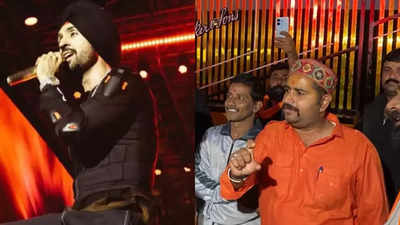
The controversy began after Diljit, an influential figure in the music and entertainment industry, shared a post on his social media accounts that was seen by some as provocative. Bajrang Dal, a Hindu nationalist group, criticized his remarks, calling them inappropriate and offensive. The protests escalated quickly, with demonstrators gathering in various locations, demanding that Diljit apologize or face consequences for his words.
Amid the growing tension, Diljit’s response has garnered significant attention, especially his reference to Rahat Indori’s poetry. Indori, celebrated for his powerful and unapologetic poetry, was known for his fierce defense of free speech and his rejection of political pressures. His words resonated deeply with Diljit, who has always been vocal about his personal values, including the importance of standing firm in the face of adversity.
The protests reflect a broader trend of increasing polarization in Indian society, where figures in the entertainment industry are often drawn into political and ideological debates. In recent years, celebrities have faced mounting pressure from various groups to conform to specific viewpoints. This trend has sparked a debate about the limits of free expression and the role of artists in political discourse.
Diljit, who has a massive following among fans, especially in the Punjabi-speaking community, has consistently used his platform to address issues close to his heart. From advocating for farmers' rights to promoting Sikh culture, Diljit has not shied away from using his celebrity status to speak out on social and political matters. His latest stand against the Bajrang Dal protests is seen as a continuation of this trend.
While some of his followers have applauded his courage and support for free speech, others have criticized his remarks as divisive. The cultural and political climate in India remains highly sensitive, with figures from both sides of the political spectrum often clashing over issues related to religion, identity, and nationalism.
The Bajrang Dal protests, however, are not isolated. They are part of a larger pattern of growing intolerance toward dissenting voices, particularly in the realm of popular culture. This has led to an ongoing debate about the balance between individual freedoms and the responsibilities of public figures.
Rahat Indori's legacy of using poetry to speak truth to power has been a guiding light for many, including Diljit. His quote, “Kisi ke baap ka Hindustan thodi hai,” emphasizes the idea that no one person or group holds exclusive rights over the nation, a sentiment that resonates with many who believe in the importance of diversity and inclusion. Diljit's invocation of this line is seen as a statement of solidarity with those who challenge the status quo and fight for the preservation of democratic values.
As the protests continue, Diljit remains resolute in his stance, unbowed by the pressure from the protestors. His response has sparked a wider conversation about the role of artists in political activism and the growing influence of social media in shaping public discourse. For many, this incident represents a moment of reckoning for the entertainment industry, as it navigates the intersection of art, politics, and public opinion.
The clash between Diljit and Bajrang Dal also highlights the complex relationship between religion, politics, and culture in India. With rising tensions surrounding issues of nationalism and identity, figures like Diljit are increasingly becoming central to discussions about the role of public figures in the national conversation. The power of social media has amplified these debates, allowing celebrities to engage directly with their audiences, while also drawing the ire of those who oppose their views.
